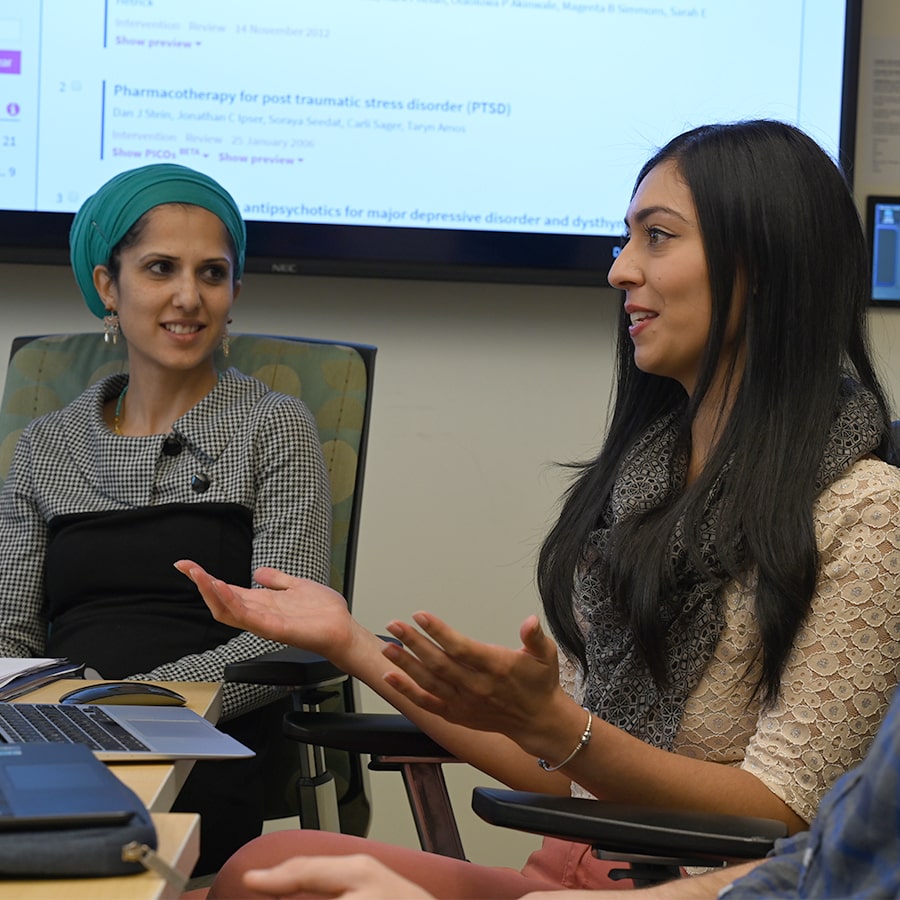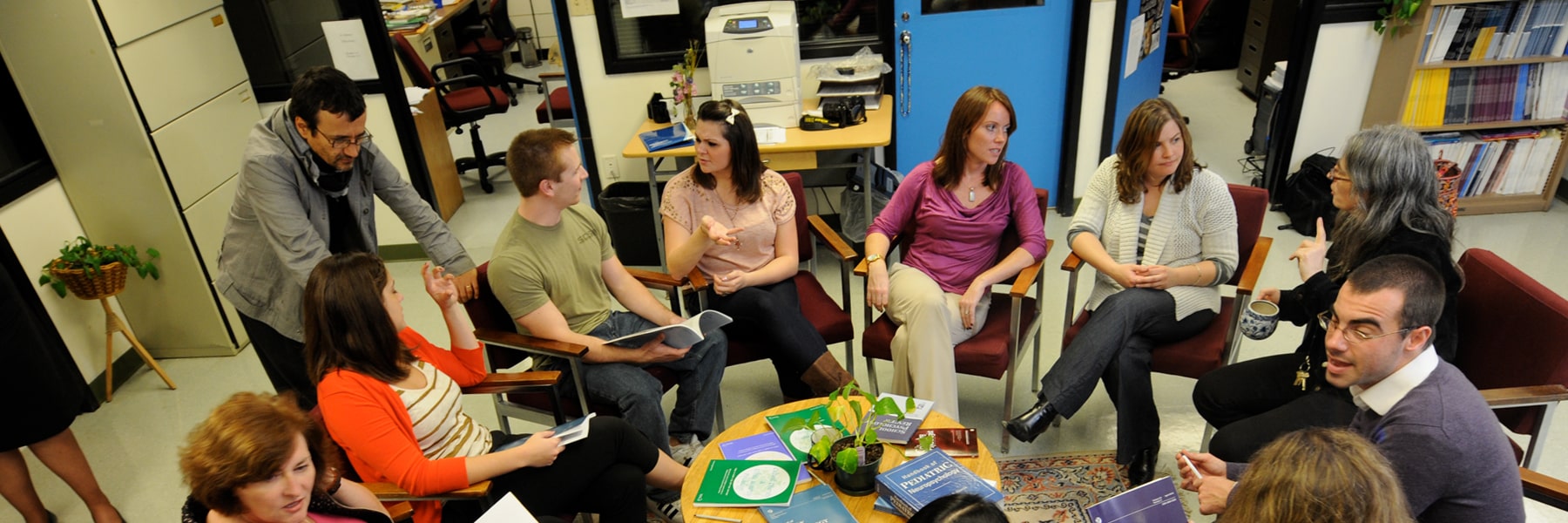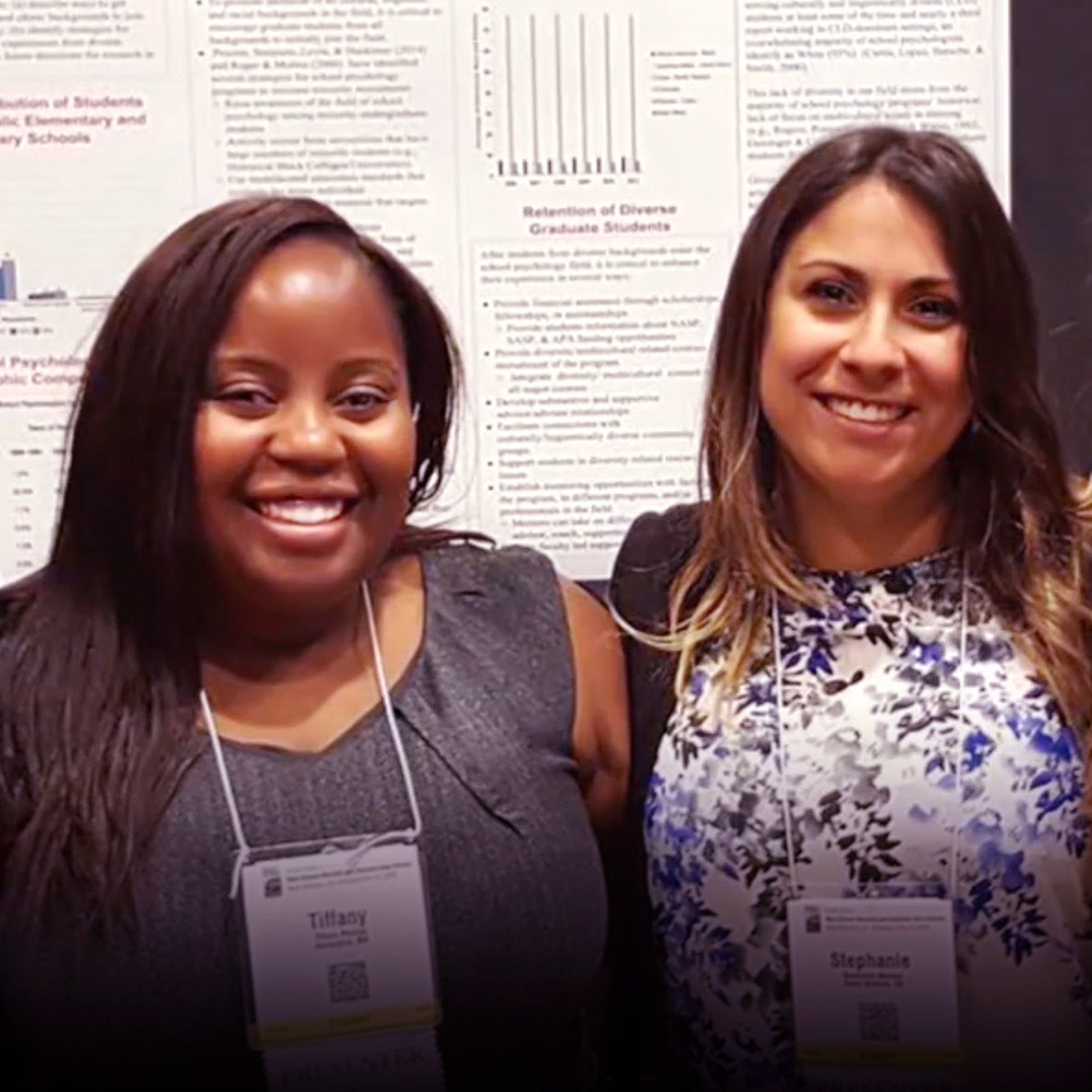Plan Your Education
How to Apply
Applicants must meet general graduate admission requirements in addition to the following program-specific requirements:
- A completed application and application fee. Application fees are waived for veterans, McNair scholars, and UMass Boston alumni. A limited number of additional application fee waivers are available on a first come first serve basis by request.
- Test Scores: Effective 2021, GRE scores are no longer required for admission to the PhD program
- Three (3) letters of recommendation: At least one addressing academic promise and ability to succeed in conducting systematic inquiry and research, and at least one addressing practice experience.
- Writing Sample: Yes
- Other:
- The Counseling Psychology PhD Program offers many excellent clinical training opportunities in the Boston metro area. At this time, the majority of our clinical practicum training takes place in the field. These placements are competitive and typically require applicants to have some supervised clinical experience. Applied master’s degree required. We are accepting applications from candidates who will have completed an applied master’s program with supervised clinical experience in a license-eligible program (e.g., Mental Health Counseling, School Psychology, School Counseling, Social Work, and other programs) prior to the Fall admission.
- Transcripts should have at least five social science classes (preferably psychology including introduction to psychology, human development, and statistics).
- A completed project or academic paper. The suggested length is 25 to 30 pages.
- A Statement of Purpose with the following components: approximately 500 words describing research interests, approximately 500 words describing practice experience, and a brief summary of future career objectives. Please do not use the statement of purpose described on the Office of Graduate Admissions web site. Many people link their interest to specific faculty expertise as that helps us match applicants to specific faculty for interviews on the interview day.
- Résumé/Curriculum Vitae
- Interview
Deadlines & Cost
Deadline: December 1 for fall
Application Fee: The nonrefundable application fee is $75. UMass Boston alumni and current students that plan to complete degree requirements prior to graduate enrollment can submit the application without paying the application fee.
Program Cost Information: Bursar’s Website
Curriculum
The program is designed to take five years of full-time study, including a full-time internship. Students who enter with a master's degree in counseling or another applied field will have a reduction in required course credits to the extent their master's level courses match our required courses, however, it is required that students complete a minimum of three years on campus plus internship. The majority of students have completed the program with four years on campus plus one additional year of internship.
Discipline-Specific Knowledge Courses (18 Credits)
- COUNSL 608 - Psychopathology and Diagnosis 3 Credit(s)
- COUNSL 620 - Life Span Human Development 3 Credit(s)
- CSP 641 - Cognitive and Affective Foundations 3 Credit(s)
- CSP 660 - Physiological Bases of Behavior 3 Credit(s)
- CSP 680 - History & Systems in Counseling and School Psychology 3 Credit(s)
- CSP 705 - Social and Cultural Psychology 3 Credit(s)
Assessment, Intervention & Supervision Courses (51 Credits)
- COUNSL 613 - Vocational Development and Career Information 3 Credit(s)
- COUNSL 614 - Counseling Theory and Practice I 3 Credit(s)
- COUNSL 616 - Group Counseling and Group Dynamics 3 Credit(s)
OR
COUNSL 650 - Group Counseling for Children and Adolescents 3 Credit(s)
- COUNSL 653 - Sociocultural Considerations in Counseling 3 Credit(s)
- COUNSL 667 - Counseling Families and Couples: Theories and Practice 3 Credit(s)
- CSP 706 - Personality Assessment 3 Credit(s)
OR
CSP 787 - Advanced Practicum III in Counseling and School Psychology 3 Credit(s)
- CSP 717 - Advanced Theory and Practice in counseling and School Psychology 3 Credit(s)
– OR other Doctoral Level Therapy Course
- CSP 780 - Supervision and Training in Psychology 3 Credit(s)
- CSP 781 - Internal Practicum in Counseling Psychology 12 Credit(s)
- CSP 783 - Practicum in Counseling Psychology I 3 Credit(s)
- CSP 784 - Practicum in Counseling Psychology II: Evidence-Based Practice 3 Credit(s)
- CSP 787 - Advanced Practicum III in Counseling and School Psychology 3 Credit(s) - complete twice
- SPY G 602 - Standardized Assessment and Report Writing 3 Credit(s)
Research Courses (27 Credits)
- CSP 703 - Research in Counseling and School Psychology 1-6 Credit(s) - 6 total credits, only 1 credit per semester counts toward total
- CSP 704 - Qualitative and Quantitative Research Methods in Counseling and School Psychology 3 Credit(s)
- CSP 708 - Intermediate Statistics in CSP 3 Credit(s)
- CSP 770 - Advanced Statistics in Counseling and School Psychology 3 Credit(s)
– OR Doctoral Advanced Qualitative Methods (e.g., PSYCLN 775) - CSP 891 - Dissertation Seminar 3 Credit(s)
- CSP 899 - Dissertation Research 1-9 Credit(s) - 9 total credits
Teaching in CSP Course (3 Credits)
- CSP 782 - Teaching in Counseling and School Psychology 3 Credit(s)
Social Justice & Ethics Courses (9 Credits)
- CSP 701 - Social Justice in Counseling and School Psychology 3 Credit(s)
- CSP 702 - Foundations and Ethics in Counseling Psychology 3 Credit(s)
- CSP 801 - Transnational Social Justice in Counseling and School Psychology 3 Credit(s)
For more information on curriculum, including course descriptions and degree requirements, visit the Academic Catalog.
Graduation Criteria
Complete a minimum of 73 credits from the following courses. Students who enter with a master’s degree in counseling or a related field will have a reduction in required course credits (maximum 36 credits) to the extent their master’s level courses match our required courses, however, students will still be required to complete a minimum of three years of coursework.
Doctoral candidacy: Completion of a qualifying paper, a critical and synthetic review of a focused body of literature in the area in which the student plans to complete the dissertation.
Dissertation: Compose and defend a research project (quantitative or qualitative) that makes a substantive contribution to the knowledge base in counseling psychology. It is usually completed by the end of the fourth year, although students may choose to complete the dissertation during or following the internship year.
Practicum: Participate in a minimum of four semesters of practicum.
Internship: Complete one full-year of an APA-Approved Internship during the fourth or fifth year after having met all course requirements.
Teaching: Serve as a teaching assistant for a minimum of one semester.
Research Team: Participate on at least one faculty-student research team for six semesters.
Statute of limitations: Eight years.
Licensure
Graduate training at the UMass Boston Counseling Psychology Program will prepare students for taking the EPPP (Examination for Professional Practice in Psychology); however, requirements for sitting for the EPPP vary by state licensing boards. The Counseling Psychology Program has reviewed the licensing requirements for all U.S. jurisdictions to determine eligibility (see below). Please note that not all graduates choose to take the EPPP.
U.S. Boards of Psychology in Which Graduates Would Be Eligible to Sit for the EPPP Upon Completion of the Doctoral Program
Alabama, Alaska, Arizona, Arkansas, Colorado, Connecticut, Delaware, District of Columbia (DC), Florida, Georgia, Hawaii, Idaho, Illinois, Indiana, Iowa, Kansas, Kentucky, Louisiana, Maryland, Massachusetts, Michigan, Minnesota, Missouri, Montana, Nebraska, Nevada, New Hampshire, New Jersey, New Mexico, North Carolina, North Dakota, Ohio, Oklahoma, Oregon, Pennsylvania, Puerto Rico, Rhode Island, South Carolina, South Dakota, Tennessee, Texas, Utah, Vermont, Virgin Islands, Virginia, Washington, West Virginia, Wisconsin, and Wyoming
U.S. Boards of Psychology in Which Graduates Would NOT Be Eligible to Sit for the EPPP Upon Completion of the Doctoral Program Without Additional Coursework
- California: additional coursework in human sexuality; alcohol/chemical dependency detection and treatment; child abuse assessment; spousal/partner abuse assessment, detection, and intervention strategies; aging and long-term care; and suicide risk assessment and intervention is needed.
- Maine: additional coursework in family or intimate partner violence screening and referral and intervention strategies, including knowledge of community resources, cultural factors, evidence-based risk assessment, and same-gender abuse dynamics is needed.
- New York: Unable to determine if a graduate is eligible. The doctoral program must be registered by the New York Licensing Department as licensure qualifying or determined by the department to be the substantial equivalent in accordance with the Regulations of the Commissioner. Please contact the New York Office of the Professions for specific details on the licensure requirements. Note: We have many alumni who are licensed in NY but historically this state has had additional requirements.
Student Admissions, Outcomes & Other Data
Contact & Faculty
Graduate Program Director / Director of Training Sharon Horne
sharon.horne@umb.edu
(617) 287-7495
Counseling & School Psychology Graduate Programs
csp.admissions@umb.edu
Counseling Psychology PhD Faculty
- Gonzalo Bacigalupe
- Laura A. Hayden
- Sharon Horne
- Sharon Lamb
- Boaz Levy
- Meredith Maroney
- Takuya Minami
- Kerrie Wilkins-Yel
Learn more about faculty, students, alumni, and the program with the Counseling & School Psychology newsletters.
About Our PhD Programs
Hear why our students chose UMass Boston's Counseling & School Psychology PhD programs.

Counseling & School Psychology
Learn more about UMass Boston's Counseling & School Psychology department, our research, and our faculty.
Explore the Department of Counseling & School Psychology
College of Education & Human Development
Learn more about the faculty, research, and programs that make up our College of Education & Human Development.
Explore College of Education & Human DevelopmentAccreditation
The Counseling Psychology Program has been continuously accredited since 2015 by the American Psychological Association Office of Program Consultation and Accreditation. Questions related to the program’s APA accreditation status should be directed to the Commission on Accreditation:
Office of Program Consultation and Accreditation American Psychological Association
750 1st Street, NE, Washington, DC 20002
Phone: (202) 336-5979 / E-mail: apaaccred@apa.org / Web: www.apa.org/ed/accreditation

